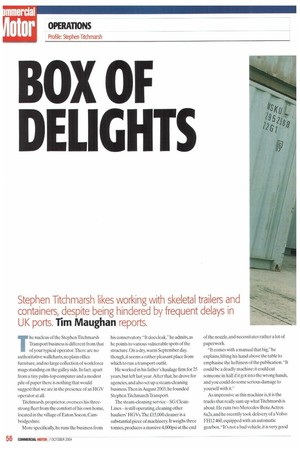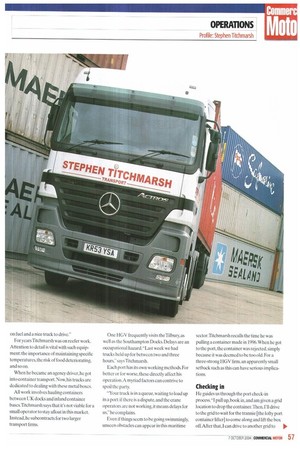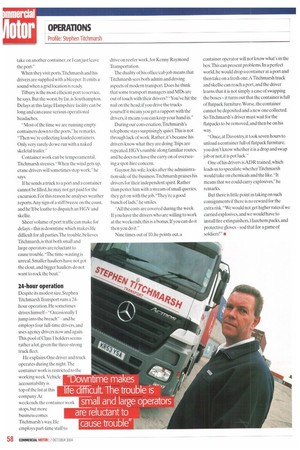BOX OF DELIGHTS
Page 56

Page 57

Page 58

If you've noticed an error in this article please click here to report it so we can fix it.
Stephen Titchmarsh likes working with skeletal trailers and containers, despite being hindered by frequent delays in
UK ports. Tim Maughan reports.
The nucleus of the Stephen Titchmarsh Transport business is different from that of your typical operator.There are no authoritative wallcharts, no plain office furniture, and no large collection of workforce mugs standing on the galley side. In fact, apart from a tiny palm-top computer and a modest pile of paper there is nothing that would suggest that we are in the presence of an HGV operator at all.
Titchmarsh, proprietor,oversees his threestrong fleet from the comfort of his own home, located in the village of Eaton Socon, Cambridgeshire.
More specifically,he runs the business from his conservatory. "It does leak." he admits, as he points to various vulnerable spots of the structure. On a dry, warm September day, though, it seems a rather pleasant place from which to run a transport outfit.
He worked in his father's haulage firm for 25 years, but left last year. After that, he drove for agencies, and also set up a steam-cleaning business.Then in August 2003, he founded StephenTitchrnarch Transport.
The steam-cleaning service SG CleanLines— is still operating, cleaning other hauliers' HGVs.The £15,000 cleaner is a substantial piece of machinery. It weighs three torines,produces a massive 4,000psi at the end of the nozzle, and necessitates rather a lot of paperwork.
"It comes with a manual that big," he explains, lifting his hand above the table to emphasise the heftiness of the publication."It could be a deadly machine; it could cut someone in half if it got into the wrong hands, and you could do some serious damage to yourself with it."
As impressive as this machine is, it is the trucks that really sum up what Titchmarsh is about. He runs two Mercedes-Benz Actros 6x2s, and he recently took delivery of a Volvo FH12 460, equipped with an automatic gearbox. "It's not a bad vehicle, it is very good on fuel and a nice truck to drive."
For years Titchmarsh was on reefer work. Attention to detail is vital with such equipment: the importance of maintaining specific temperatures, the risk of food deteriorating, and soon.
When he became an agency driver, he got into container transport. Now, his trucks are dedicated to dealing with these metal boxes.
All work involves hauling containers between UK docks and inland container bases.Titchmarsh says that it's not viable for a small operator to stay afloat in this market. Instead, he subcontracts for two larger transport firms. One HG V frequently visits the Tilbury, as well as the Southampton Docks. Delays are an occupational hazard. -Last week we had trucks held up for between two and three hours," says Titchmarsh.
Each port has its own working methods. For better or for worse,these directly affect his operation.A myriad factors can contrive to spoil the party.
"Your truck is in a queue, waiting to load up in a port: if there is a dispute, and the crane operators are not working, it means delays for us," he complains.
Even if things seem to be going swimmingly, unseen obstacles can appear in this maritime sector.Titchmarsh recalls the time he was pulling a container made in 1996. When he got to the port, the container was rejected, simply because it was deemed to be too old. For a three-strong HGV firm, an apparently small setback such as this can have serious implications.
Checking in He guides us through the port check-in process.-I pull up, book in, and am given a grid location to drop the container.Then. I'll drive to the grid to wait for the trannie [the lofty port container lifter] to come along and lift the box off.After that.! can drive to another grid to O. take on another container, or! can just leave the port."
When they visit portsTitchmarsh and his drivers are supplied with a bleeper. It emits a sound when a grid location is ready.
'Tilbury is the most efficient port to service, he says. But the worst, by far, is Southampton. Delays at this large Hampshire facility can be long and can cause serious operational headaches.
"Most of the time we are running empty containers down to the ports," he remarks, "Then we're collecting loaded containers Only very rarely do we run with a naked skeletal trailer."
Container work can be temperamental. Titchmarsh stresses. "When the wind gets up, crane drivers will sometimes stop work,he says.
If he sends a truck to a port and a container cannot be filled, he may not get paid for the excursion. For this reason he analyses weather reports.Any sign of a stiff breeze on the coast. and he'll be loathe to dispatch an HGV and skellie.
Sheer volume of port traffic can make for delays-this is downtime which makes life difficult for all parties.The trouble,believes Titchmarsh, is that both small and large operators are reluctant to cause trouble. "The time-wasting is unreal. Smaller hauliers have not got the clout, and bigger hauliers do not want to rock the boat."
24-hour operation
Despite its modest size, Stephen Titchmarsh Transport runs a 24hour operation. He sometimes drives himself -"Occasionally I jump into the breach"and he employs four full-time drivers, and uses agency drivers now and again. This pool of Class 1 holders seems rather a lot, given the three-strong truck fleet.
He explains. One driver and truck operates during the night.The container work is restricted to the working week.Vehicle accountability is top of the list at this company.At weekends, the container work stops,but more business comes Titchmarsh's way. He employs part-time staff to drive on reefer work, for Kenny Raymond Transportation.
The duality of his office/cab job means that Titchmarsh sees both admin and driving aspects of modern transport. Does he think that some transport managers and MDs are out of touch with their drivers? -You've hit the nail on the head: if you drive the trucks yourself it means you get a rapport with the drivers, it means you can keep your hand in."
During our conversation,Titchmarsh's telephone stays surprisingly quiet.This is not through lack of work. Rather, it's because his drivers know what they are doing.Trips are repeated, HGVs rumble along familiar routes, and he does not have the carry on of overseeing a spot-hire concern.
Gaynor, his wife, looks after the administration side of the business.Titchmarsh praises his drivers for their independent spirit. Rather than pester him with a stream of small queries, they get on with the job.-They're a good bunch of lads," he smiles.
-All the costs are covered during the week. If you have the drivers who are willing to work at the weekends,this is a bonus. If you can do it then you do it."
Nine times out of 10, he points out, a container operator will not know what's in the box:This can present problems In a perfect world, he would drop a container at a port and then take on a fresh one.A Titchmarsh truck and skellie can reach a port, and the driver learns that it is not simply a case of swapping the boxesit turns out that the container is full of flatpack furniture.Worse, the container cannot be deposited and a new one collected. So Titchmarsh's driver must wait for the flatpacks to be removed, and then be on his way.
"Once, at Daventry, it took seven hours to unload a container full of flatpack furniture; you don't know whether it is a drop and swap job or not, it is pot luck."
One of his drivers is ADR trained, which leads us to speculate whether Titchmarsh would take on chemicals and the like." It means that we could carry explosives," he remarks.
But there is little point in taking on such consignments if there is no reward for the extra risk. "We would not get higher rates if we carried explosives, and we would have to install fire extinguishers, Hazchem packs, and protective gloves -sod that for a game of soldiers!" •






























































































































































































